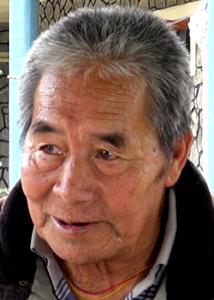Name: Badho
(Alias: No)
Gender: Male
Interview Age: 84
Date of Birth: 1931
Birthplace: Nangchen, Kham, Tibet
Year Left Tibet: 1959
Profession: Servant
Monk/Nun: No
Political Prisoner: Yes

Interview No.: 45N
Date: 2015-04-15
Language: Tibetan
Location: Jampaling, Tanahun, Gandaki, Nepal
Categories: Culture and History, Oppression and Imprisonment
Keywords: Chinese -- first appearance of, Chinese -- oppression under, escape experiences, imprisonment, Kham, monasteries -- destruction of , poor/lower class, servitude
Summary:
Badho was born in Nangchen Dhiyagong under the King of Nangchen, who ruled a large region with 18 divisions and a population of 120,000. Badho belonged to a poor family and he and his brother performed various kinds of work for the local monastery like carrying water, herding animals, collecting dung for fuel and carrying soil and rocks during construction of houses. They received food and housing but no wages for their work.
Badho recounts about how the invading Chinese initially appeared to be friendly and paid for food with silver coins. Gradually their behavior grew worse and they tightened their grip with arrests, imprisonments, torture and physical struggle sessions of influential people, lamas and leaders. Badho's other brother was a monk, who was killed by the Chinese when 300-400 monks hiding in a cave were bombarded from the air.
Many of the poor Tibetans were coerced into helping the Chinese, but Badho resisted. Badho was imprisoned for one month and interrogated. The Chinese forced the prisoners to cut into pieces the swords, cauldrons and Buddhist statues from monasteries to be converted into weapons. Badho recounts his daring escape back home to his mother who urged her two sons to flee before the Chinese captured them.
Interview Team:
- Tenzin Yangchen (Interpreter)
- Katharine Davies Samway (Interviewer)
- Henry Tenenbaum (Videographer)

